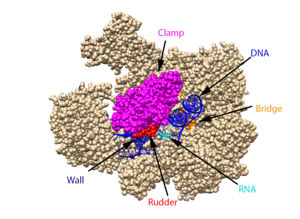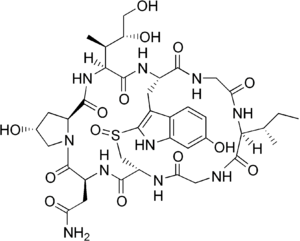RNA Polymerase II
From Proteopedia
| Line 38: | Line 38: | ||
3. <scene name='82/824648/Tfiif/1'>TFIIF</scene> binds directly to RNAP II and escorts it to the promoter while <scene name='82/824648/Tfiib/1'>TFIIB</scene> helps the complex bind correctly. | 3. <scene name='82/824648/Tfiif/1'>TFIIF</scene> binds directly to RNAP II and escorts it to the promoter while <scene name='82/824648/Tfiib/1'>TFIIB</scene> helps the complex bind correctly. | ||
| - | 4. <scene name='82/824648/Tfiie/1'>TFIIE</scene> and <scene name='82/824648/Tfiih/1'>TFIIH</scene> are sequentually recruited which completes the PIC. | + | 4. <scene name='82/824648/Tfiie/1'>TFIIE</scene> and <scene name='82/824648/Tfiih/1'>TFIIH</scene> are sequentually recruited which completes the <scene name='82/824648/Pic/1'>PIC</scene>. |
PIC NON-TRANSPARENT COMPLEX | PIC NON-TRANSPARENT COMPLEX | ||
| Line 44: | Line 44: | ||
CENTERING F | CENTERING F | ||
| - | Once the PIC is formed, RNAP II initiates RNA synthesis and produces a short transcript. When RNAP II becomes phosphorylated, it releases some of the GTFs from the complex and moves away from the promoter. TFIID stays bound to the promoter and can reinitiate transcription. The transcription factors are replaced by a new six-protein complex call the Elongator. TFIIF and TFIIH both remain associated with RNAP II during elongation. | + | Once the <scene name='82/824648/Pic/1'>PIC</scene> is formed, RNAP II initiates RNA synthesis and produces a short transcript. When RNAP II becomes phosphorylated, it releases some of the GTFs from the complex and moves away from the promoter. TFIID stays bound to the promoter and can reinitiate transcription. The transcription factors are replaced by a new six-protein complex call the Elongator. TFIIF and TFIIH both remain associated with RNAP II during elongation. |
Revision as of 22:01, 7 December 2019
| |||||||||||
References
Bushnell, D. A.; Westover, K. D.; Davis, R. E.; Kornberg, R. D. Structural Basis of Transcription: An RNA Polymerase II-TFIIB Cocrystal at 4.5 Angstroms. Science. 2004, 303, 983-988
Cramer, P.; Bushnell, D. A.; Kornberg, R. D. Structural Basis of Transcription: RNA Polymerase II at 2.8 Ångstrom Resolution. Science. 2001, 292, 1863-1876
Evans, D. A.; Fitch, D. M.; Smith, T. E.; Cee, V. J. Application of Complex Aldol Reactions to the Total Synthesis of Phorboxazole B. J. Am. Chem. Soc. 2000, 122, 10033-10046.
Gnatt, A. L.; Cramer, P; Fu, J.; Bushnell, D. A.; and Kornberg, R. D. Structural Basis of Transcription: An RNA Polymerase II Elongation Complex at 3.3 Å Resolution. Science. 2001, 292, 1876-1882 1i6h
He, Yuan, et al. Near-atomic resolution visualization of human transcription promoter opening. Nature 533.7603. 2016.
Orphanides, George, Thierry Lagrange, and Danny Reinberg. The general transcription factors of RNA polymerase II. Genes & development 10.21. 1996. 2657-2683
Uzman, A.; Voet, D. Student companion Fundamentals of biochemistry: life at the molecular level, 4th ed., Donald Voet, Judith G. Voet, Charlotte W. Pratt; John Wiley & amp; Sons, 2012.
Xu, J.; Lahiri, I.; Wang, W.; Wier, A.; Cianfrocco, M. A.; Chong, J.; Hare, A. A.; Dervan, P. B.; DiMaio, F.; Leschziner, A. E.; Wang, D. Structural Basis for the Initiation of Eukaryotic Transcription-coupled DNA Repair. Nature. 2017. 551, 653-657 5vvr
Yan, C., Dodd, T., He, Y., Tainer, J. A., Tsutakawa, S. E., & Ivanov, I. (2019). Transcription preinitiation complex structure and dynamics provide insight into genetic diseases. Nature Structural and Molecular Biology, 26(6), 397-406.
Alpha-aminitin chemical structure image courtesy of https://en.wikipedia.org/wiki/Alpha-Amanitin#/media/File:Alpha-amanitin_structure.png
Notes
From structural components:
Structural overview: [PDB: 5VVR: with highlighted sections mentioned below]
Bridge: Depicted: [PDB: 1I6H: 810-845.a]
Wall: Depicted: [PDB: 1R5U: 853-919.b; 933-972.b]
Clamp: Depicted: [PDB: 1R5U: 3-345.a; 1395-1435.a; 1158-1124.b]
Rudder: Depicted: [PDB: 5VVR: 306-321.a]
Content Donators
This page was created as a final project for the Advanced Biochemistry course at Wabash College during the Fall of 2019. This page was reviewed by Dr. Wally Novak of Wabash College.
Proteopedia Page Contributors and Editors (what is this?)
Titus Edwards, Abraham Kiesel, Wally Novak, James Daniel Andry, Michal Harel, Karsten Theis


